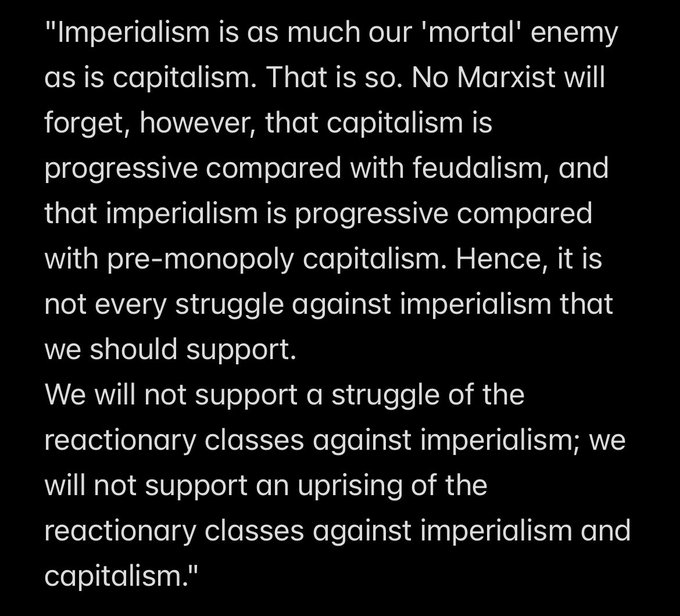So, I've seen discussions on here that make me think most people here think that multipolarity would be helpful. But I saw some discourse elsewhere about the topic and there was a lot of disagreement about it, but most people were against actively working towards it and said that it wouldnt help anything. I also talked to my three main ML discord friends about the topic and none of them really supported it. One was against it entirely, another fairly neutral, and the other said its not a goal in and of itself but would serve a progressive purpose.
(Their positions on the Ukraine war are also more moderated than some of the ones I see on here though? But I'm also very mixed up and confused about what people think right now because some of the things my friends said were nOT what I thought they thought about the situation).
Ive seen the following Lenin quote used against the idea of multipolarity:

But I've also been told that thats not what Lenin meant at all and that he was talking more domestically than about geopolitical conflict. The quote above is also used as an argument against "critical support of Russia", and MLMs (and anti-Dengist MLs, and Leftcoms) use it as an argument against "critical support of China". My friends online all have slightly different takes on the Ukraine War, one sees it as inter-imperialist conflict and "fundamentally similar to WW1", but another thinks that Russia doesn't count as imperliast under the Leninist definition but is still against the invasion. These are both more moderate takes than i USUALLY see here but I know we arent a monilith. The one that thinks its an inter-imperalist conflict stands by this statement from her party: https://ycl.org.uk/2022/02/25/the-central-committee-of-the-young-communist-league-has-issued-the-following-statement-in-response-to-russian-invasion-of-ukraine/ and dismisses "critical support for Russia" as "twitter jibber jabber". Both, however, think that revolutionairy defeatism means that we as people living in NATO countries should oppose our own country's involvement in the war and oppose NATO generally. I do remember getting into an argument here with someone, who has since gone inactive, who felt that revolutionairy defeatism does NOT apply to Russians living in Russia, and I thought it did. They thought that Russia is a national struggle for its survival and should win outright ect. That is a more extreme position than I usually see from others here, and my side of that argument got more upbears I think.
Sorry, I have a problem where i learn best through discourse and rely on people who I admire and think of as smarter than me to help me figure things out. And when they disagree, I get confused X_X. I know thats not the best, but its the way my brain functions unfortunately. I'm sorry my brain is developing in real time and Im not sure what to think about things right now. This turned into a long rant about stuff thats not all related to the main question. But any input or help you could give would be welcome.
That's just the introduction
Also subscribing to Leninist definitions of imperialism as a stage of capitalism, or how a country needs to meet certain criteria to be sufficiently imperialist, is not always the most useful in modern context. Especially for those that subscribe to the theories of a globalised law of value, super exploitation, polarisation and imperialist rent. Many third worldists disagree with Lenin and believe that capitalism has always been imperialist since the beginning. I'll just quote Samir Amin again because I'm not good at explaining it.